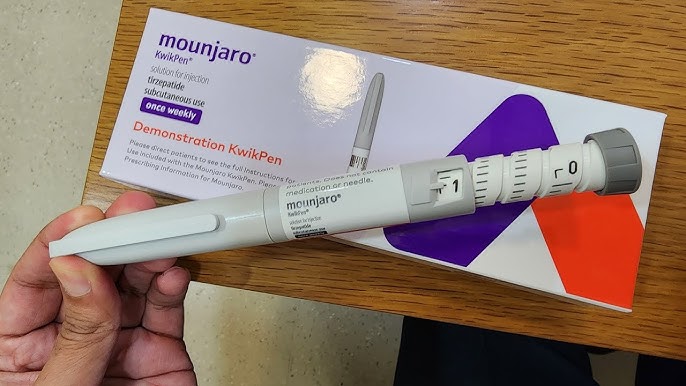India is grappling with a formidable health crisis. With officially 101 million individuals living with diabetes and approximately 100 million classified as obese, the nation faces an unprecedented challenge. The prevalence of diabetes stands at 12%, while pre-diabetes affects 15% of the population.
This basically means that roughly 27% of Indians contend with severe insulin resistance.Meanwhile, obesity affects 40% of the population – the odds increasing with age – particularly among women and urban residents.
Recently, Eli Lilly introduced Mounjaro (Tirzepatide) in India, supposedly as a novel pharmaceutical option for managing both type 2 diabetes and obesity. Approved by the Central Drugs Standard Control Organisation, this drug promises improved blood sugar control and weight loss. However, while such medications offer immediate solutions, a functional medicine perspective emphasizes addressing the root causes of these conditions for sustainable, long-term health benefits.
In this blog, we explore India’s dual burden of diabetes and obesity, the emerging wave of weight-loss drugs and how they compare with the functional medicine approach, and the future of diabetes and obesity care in India.
India’s Dual Burden: Diabetes & Obesity
Over the past three to four decades, India has witnessed twin epidemics of metabolic disorders and obesity, though their significance was only recently acknowledged. Approximately 12% of Indians have diabetes, and 15% have pre-diabetes, conditions that reflect severe insulin resistance. The conventional distinction between diabetes and pre-diabetes, based solely on blood sugar thresholds, overlooks their shared root: carbohydrate intolerance, insulin resistance and mitochondrial dysfunction. Rather than waiting for pre-diabetes to progress into full-blown diabetes (where lifelong drug dependency becomes the norm), functional medicine advocates for aggressive early intervention.
Obesity, affecting 40% of the population, compounds this crisis. The World Health Organization has proposed lower BMI cut-offs for Asian populations: 18.5–22.9 as normal, 23–24.9 as overweight, and 25 or higher as obese. Physical inactivity and prolonged abuse to the body from food and lifestyle are the strongest predictors of obesity, which is a major risk factor for non-communicable diseases like diabetes, metabolic and cardiovascular.

Notably, 80% of obese individuals exhibit insulin resistance, yet 40% of lean individuals also suffer from this condition. This points to the fact that obesity can also be seen in lean individuals due to fat deposits in organs (visceral fat), and is not only due to external belly fat.
Current medical treatments focus on symptomatic relief, which includes low-calorie diets and exercise for obesity, and medications for diabetes. However, the outdated calorie-in/calorie-out formula which has been practiced for 40–50 years, has proved to be ineffective for sustained weight loss due to a basic fallacy: it ignores the actual problems, i.e. insulin resistance, mitochondrial dysfunction, gut dysbiosis, etc.
So, even though lab results might show some stabilization, the body’s ability to utilize glucose effectively remains impaired. When this deregulation is persistent, it leads to complications affecting major organ systems, thus affecting longevity.
Moreover, gut health significantly influences metabolic disorders. Gut dysbiosis – an imbalance in the microbiome – can lead to leaky gut, endotoxemia, and liver inflammation (steatohepatitis), triggering systemic inflammation and insulin resistance, which drive both obesity and diabetes.
Mounjaro and the Emerging Wave of Weight-Loss Drugs
Recently, Mounjaro was launched in India as a single-dose vial, representing a new frontier in managing obesity and type 2 diabetes. Its active ingredient Tirzepatide, is a dual GIP and GLP-1 receptor agonist administered weekly via injection. These are hormones that enhance insulin secretion (when the problem is of insulin resistance, not low insulin), slow gastric emptying, and increase satiety, thereby reducing appetite and aiding weight loss.
Marketed as an adjunct to a well-formulated diet and increased physical activity, Mounjaro joins a growing class of therapies alongside Zepbound, Ozempic and Wegovy (Semaglutide)– GLP-1 receptor agonists which are expected to enter the Indian market soon.

However, these drugs come at a steep cost. Mounjaro is priced at Rs. 4,375 for a 5 mg vial and Rs. 3,500 for a 2.5 mg vial, translating to a monthly expense of Rs. 14,000–17,500. At the highest dose (15 mg weekly), the annual cost could reach Rs. 7 lakhs, rendering it unaffordable for many.
Beyond costs, no drug comes without risks. Common side effects of Mounjaro include nausea, vomiting, abdominal pain, constipation, diarrhea, fatigue, and hair loss. Serious complications may involve acute pancreatitis, kidney damage, gallbladder disease, hypoglycaemia, diabetic retinopathy, and even suicidal thoughts.
In fact, we have limited understanding of the mechanisms by which Mounjaro and other similar proclaimed breakthroughs, like bariatric surgery, can achieve sustained weight loss. Moreover, the long-term durability of the weight loss achieved by these means is not yet fully understood.
Given the risk-benefit ration ratio and knowing that this isn’t a permanent solution but a quick fix, the question to be asked is – should we actually be using these drugs at all?
Functional Medicine vs. Medication-Driven Approaches
Pharmaceutical interventions, claiming to be a miraculous drug like Mounjaro may offer symptomatic relief, and rarely address the underlying causes of metabolic dysfunction. By contrast, functional medicine seeks to restore long-term metabolic health by targeting root issues.
Ultra-processed foods (laden with excess sugars, seed oils, and refined grains) elevate insulin levels and foster insulin resistance over time. Magic pills like Mounjaro often ignore this. Instead, they focus on quick fixes that allow chronic conditions to progress, leading to complications.
Functional medicine identifies key drivers of metabolic disorders such as nutrient deficiencies, chronic inflammation, gut issues, poor sleep, and imbalances in insulin, cortisol and leptin.
Nutrient deficiencies like Vitamin B & D, magnesium, and potassium impair insulin sensitivity. Chronic inflammation – which often stems from gut dysbiosis or leaky gut – disrupts hormonal balance. Meanwhile, imbalances in insulin, cortisol, and leptin perpetuate weight gain and insulin resistance.
By addressing these factors, functional medicine offers a path to reverse diabetes naturally and manage weight effectively, reducing reliance on lifelong medications.
Functional Medicine Strategies for Diabetes & Weight Management
Functional medicine employs personalized, evidence-based strategies to combat diabetes and obesity. Some of the salient features are enlisted hereinafter:
- Personalized Nutrition Plans: Diets rich in low-glycaemic whole foods stabilize blood sugar, while nutrient-dense meals replete deficiencies. Eliminating ultra-processed foods, wheat, dairy and switching from fast carbs (refined, fibreless) to slow carbs (fiber-rich) is critical. Sugar intake should be capped at 6 teaspoons daily for adults and 3 for children, with sugary drinks avoided entirely. Diabetics and pre-diabetics would do better to quit sugar completely.
- Gut Health & Hormonal Balance: Healing leaky gut and correcting dysbiosis improve metabolic function. High insulin inhibits fat loss, while chronic stress elevates cortisol. This in turn promotes gluconeogenesis which impairs insulin signalling and worsens insulin resistance. Leptin resistance is driven by high insulin, fructose, and inflammation. It fuels persistent hunger and weight gain. Stress reduction techniques such as meditation and grounding, adequate sleep, and fasting (16–18-hour windows or twice-weekly meal skips), help rebalance these hormones.
- Lifestyle Interventions: Daily movement and strength training enhance insulin sensitivity and increase lean body mass, which boosts basal metabolic rate (60–70% of energy expenditure). The goal is not just to burn calories, but to improve resilience and body composition – keeping fat mass below 18% for men and 28% for women.Additionally, balancing quality sleep, stress, circadian rhythm, and hydration among others —because no diet or workout can outdo a dysregulated body.
- Natural Supplements & Therapies: With its anti-inflammatory properties, Curcumin enhances insulin sensitivity and metabolism. Berberine (500 mg thrice daily) activates AMPK to regulate metabolism, lower blood sugar, and support weight loss. Chromium picolinate (200–1,000 mcg daily) improves insulin action and glucose control. Ayurvedic herbs like sprouted fenugreek, cinnamon, and ginseng, alongside alpha-lipoic acid and milk thistle, offer additional benefits. Most Indians are deficient in Vitamin D, magnesium (RDA: 400 mg), and potassium (RDA: 4,700 mg), which can be sourced from leafy greens, nuts, and seeds, though supplementation is often necessary due to depleted food systems.
The Future of Diabetes & Obesity Care in India
While drugs like Mounjaro can provide an artificial temporary glycaemic control and weight loss, their economic burden could be staggering. Medications should complement, not replace, foundational health practices. Functional medicine offers preventive, personalized solutions that tackle the roots of disease, potentially halting progression and reducing drug dependency. Wellfinity – an expert-led virtual care platform – exemplifies this approach by assessing biomarkers, nutrient deficiencies, stress levels, and comorbidities, to devise tailored diet, lifestyle, and supplementation plans for lasting metabolic health.
The advent of anti-obesity and diabetes drugs like Mounjaro might sound like a blessing for the fight against these epidemics. Yet, their high costs, side effects, and symptomatic focus underscore the need for a balanced approach. Besides, there can never be a one-pill wonder drug without any side-effects or long-term implications.
On the other hand, functional medicine provides a holistic alternative, addressing root causes like insulin resistance, gut dysbiosis, and hormonal imbalances through lifestyle interventions and natural therapies.
Wellfinity’s personalized care empowers individuals to achieve sustainable wellness beyond medications. For those ready to take charge of their health, scheduling a consultation with Wellfinity’s experts is a vital first step toward lasting metabolic vitality.



